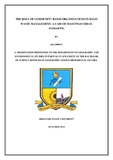Please use this identifier to cite or link to this item:
https://cris.library.msu.ac.zw//handle/11408/2167| Title: | The role of community based organizations in solid waste management. a case of Masvingo urban, Zimbabwe. | Authors: | Bgwoni, Tanya T. | Keywords: | Community based organizations, solid waste management. | Issue Date: | Oct-2015 | Publisher: | Midlands State University | Abstract: | The study investigated the role of community based organizations in sustainable solid waste management. Solid waste management has become a big issue in our day and age at local, national, regional and even at global scale. Community based organizations in developing countries have been done but there are gaps in the real documentation in their full participation in solid waste management, constraints affecting them as well as suggested solutions. The study’s main aim was/is to identify the role of community based organizations in solid waste management and assess their effectiveness and also to come up with solutions to make their role effective. The study area was basically in Masvingo urban which is made up of 7 wards and in these 7 wards that is where the collective name Community Based Organizations came into being. The area was also selected as a result of ever growing population be it by reproduction or migration, unsustainable waste handling and poor disposal practices which are likely to make Masvingo vulnerable to disease outbreak like cholera. The study made use of self administered questionnaires, interviews, photographs and observations. Information gathered was analysed and interpreted using descriptive statistics, graphs, tables and inferential statistics in the form of the chi-square test. The main findings showed that the community based organizations manage waste mainly by recycling or re-using it amongst other waste management activities and this also revealed that Masvingo City council is failing to manage solid waste in Masvingo urban. The study also revealed that the private sector is also taking part in trying to manage solid waste through clean-up campaigns, education awareness, recycling. Awareness on legislation and institutional aspects varied from person to person. In conclusion to the above findings the researcher recommends technical and financial support to be given to the community based organizations in all their aims to manage solid waste and wanting to make Masvingo urban a clean town. Environmentally sustainable solid waste management practices guided by the principles of the integrated approach and invigorated by environmental education must be fully adopted. | URI: | http://hdl.handle.net/11408/2167 |
| Appears in Collections: | Bsc Geography And Environmental Studies Honours Degree |
Files in This Item:
| File | Description | Size | Format | |
|---|---|---|---|---|
| Tanya -Dissertation.pdf | Full text | 1.62 MB | Adobe PDF |  View/Open |
Page view(s)
212
checked on Feb 24, 2025
Download(s)
340
checked on Feb 24, 2025
Google ScholarTM
Check
Items in MSUIR are protected by copyright, with all rights reserved, unless otherwise indicated.



